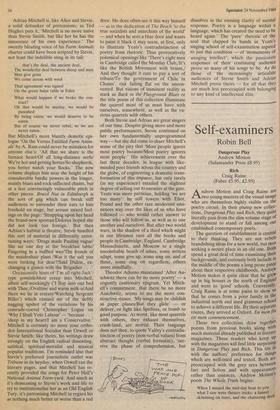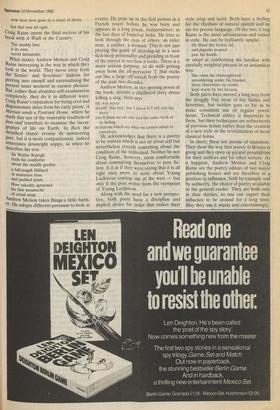Self-examiners
Robin Bell
Rich Craig Raine (Faber £5.95, £2.95)
Andrew Motion and Craig Raine are two young masters of the visual image who are themselves highly visible on the poetry circuit. In their plump new collec- tions, Dangerous Play and Rich, they quite literally pass from the slim volume stage of development to stand or fall among our established contemporary poets. The question of establishment is central to their thinking. They are not rebels brandishing ideas for a new world, but men seeking a secure place in an old one. Both spend a great deal of time examining their backgrounds, and curiously both include the middle of the poems a long prose piece about their respective childhoods. Andrew Motion makes it quite clear that he greW up in big houses in the south of England and went to 'good' schools. ConverselY, Craig Raine is at some pains to show us that he comes from a poor family in the industrial north and used grammar school to achieve a different life. By their separate routes, they arrived at Oxford. En mon fin est mon commencement.
These two collections draw together poems from previous books along with much material already published in literary magazines. Those readers who keep UP with the magazines will find little surprising in Dangerous Play and Rich. This fits in with the authors' preference for things which are well-tried and tested. Both are preoccupied with the grey area between fact and fiction and with appearances rather than essences. Andrew Motion s poem The Whole Truth begins: When I missed the mid-day boat to you what I saw were theatre tricks: a funnel skimming on trees, and the chattering deck
now here now gone in a cloud of thorn.
but that was all right.
Craig Raine opens the final section of his book with A Walk in the Country:
The muddy lane IS its own travel document.
What makes Andrew Motion and Craig Raine interesting is the way in which they look at the world. They move away from the Sixties' and Seventies' fashion for Peering into oneself and externalising the Present inner moment in earnest phrases. Rut, rather than abandon self-examination completely, they do it in different ways. Craig Raine's reputation for being cool and dispassionate dates from his early poem, A Martian sends a Postcard Home, where he made fine use of the venerable tradition of faux-naif travellers to examine the incon- gniities of life on Earth. In Rich the detached stance retains its unwavering gaze, but it is more compassionate, indeed sometimes downright soppy, as when he describes his son:
Sir Walter Raleigh trails his comforter about the muddy garden a full-length Hilliard in miniature hose and padded pants.
How rakishly upturned his fine moustache of oxtail soup
Andrew Motion takes things a little furth- er. He adopts different personae to look at events. He pops up in the first person in a French resort before he was born and appears in a long poem, Independence, in the last days of Imperial India. He tries to look through the eyes of others: an older man, a soldier, a woman. This is not just playing the game of dressing-up in a new skin-deep personality and parading in front of the mirror to see how it looks. There is a more serious purpose, to do with getting away from the all-pervasive 'I' that sticks out like a large off-switch from the poetry of the past two decades.
Andrew Motion, in the opening poem of the book, invents a childhood story about killing a stag, then says
He was never myself, this boy, but I know if I tell you his story you'll think we are one and the same: both of us hiding in fictions which say what we cannot admit to ourselves.
He acknowledges that there is a poetry to be written which is not all about self but nevertheless reveals something about the condition of the individual. Neither he nor Craig Raine, however, seem comfortable about committing themselves to pure fic- tion. It it as if they were saying that it is all right once more to write about Young Lochinvar coming out of the west — but only if the poet writes from the viewpoint of Young Lochinvar.
Along with the need for a new perspec- tive, both poets have a discipline and implicit desire for order that makes their style crisp and lucid. Both have a feeling for the rhythms of natural speech and an ear for precise language. Of the two, Craig Raine is the more adventurous and varied in style. He can be brilliantly simple:
He lifted the Wicker lid and pigeons poured past his hands,
or adept at confronting the familiar with carefully weighted phrases in an unfamiliar
way: She owns the thoroughbred smouldering under his blanket, those binoculars en croate kept warm by her breasts.
Both poets have moved a long way from the straggly free verse of the Sixties and
Seventies, but neither goes so far as to make consistent use of regular poetic forms. Technical ability is important to them, but their techniques are refinements of previous trends rather than the creation of a new style or the revitalisation of more classical forms.
In short, these are poems of transition. They show the way that poetry in Britain is going and they open up greater possibilities for their authors and for other writers. As it happens, Andrew Motion and Craig Raine are the poetry editors of two major publishing houses and are therefore in a position to influence, both by example and
by authority, the choice of poetry available to the general reader. They are both only in their thirties, so one can expect their influence to be around for a long time. May they use it wisely and entertainingly,























































 Previous page
Previous page